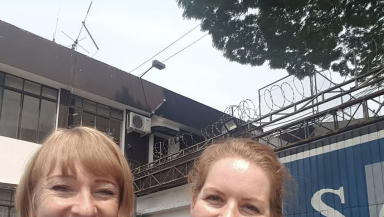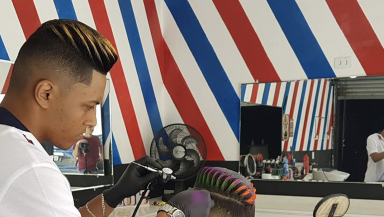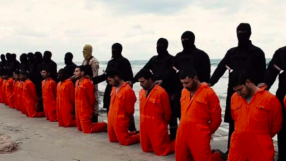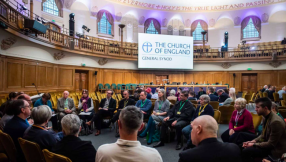
Cally Magalhães never expected to be an evangelist in Brazil. She was a successful theatre actress in England and was also active in her local church, where she was head of evangelism and ran a school ministry.
When she first went to Brazil in 1998 to work with street children she couldn't even speak Portuguese.
So how did she end up there?
"I just knew I'd be serving God somewhere in the world but I didn't know where or why," she says.
Then one day, in 1994, she was reading a magazine article about the plight of street children in Sao Paolo and how they often sleep in tunnels under the streets to escape the corrupt police and pedophiles.
"But in Sao Paolo, there are torrential rains in the summer and they fill up the sewars and the tunenls, and so sometimes the children drown in the night. I read that and cried and cried and cried," she recalls.
"I felt so strongly that this shouldn't be happening and God so clearly touched my heart. In that moment, I really felt that God was calling me.
"It was crazy because I didn't know anything about Brazil, I couldn't speak Portuguese, and I was totally involved with my local church but I just knew I had to go so I asked God for a really clear sign.
"I didn't want to go on an emotional response; I needed Him to show me that He really wanted me to come to Brazil.
"Then one day, as I was walking along the road, literally praying and weeping, I went into a shop and when I came out, there on the other side of the road was a bright yellow skip with the word 'Brazil' written across the side in red capital letters."
That was all the sign she needed and soon after that, she moved to a slum where nine people were murdered in the first week she arrived.
"But I didn't feel afraid. I felt complete peace that I was in the right place," she says.
The slums - or favelas as they are called locally - are rated 1 to 5 stars, like hotel ratings, with the 5-star favelas being the best, with houses made of brick, electricity and better sanitation.
"The worse the slum is, the more dangerous it is and the degree of poverty is unbelievable. The conditions in the lower star favelas are absolutely terrible. You wouldn't even want your dog to live there," says Cally.
More than two decades later and Cally is still in Brazil working with people in need, although the nature of her work has changed since she first arrived.
She is no longer working directly in the slums but is instead running a psychodrama ministry in Brazil's prisons that utilises all of her acting experience in a profound way.
The Eagle Project works primarily with young offenders, and its primary goal is to break the destructive cycle of reoffending by helping them to see that, with the right choices, they can have a different future.
It does this by putting them into groups to reenact their crimes and placing them into different roles, like the victim, their parent or a police officer.
As they act out these roles, they are better able to understand the perspectives of everyone involved and, importantly, how each person might be feeling.

So why is psychodrama so effective?
"It's almost like rewiring their brains," Cally explains.
"When they act in these scenes as their mum or the victim or the police officer, the penny drops in a way it doesn't if they are just sitting and talking about it with a psychologist; it doesn't get to them.
"With psychodrama, they come out of it saying 'oh my goodness, I never thought about my victim and now I can't stop thinking about my victim.'
"It's as if for the first time they realise the consequences of what they're doing and they can't go on doing it because they've realised that it's wrong.
"Just putting themselves into someone else's shoes and doing role reversal is so powerful."
For Cally and the team, what's always really important is that the youths understand that "their past is in the past and if they want to leave that behind and move forward, then we want to move forward with them and walk into the future and all that God has for them".
Love and respect for the participants in the programme is an important part of the work, and the impact this has is reflected in the waiting lists for the Eagle Project's prison groups.
"That's one of the most powerful things about the project," she says. "We have waiting lists because they feel loved, and they can see that there are people who want to love them and walk with them, and they're not going to be judged for their past. That's a very powerful thing to experience when you're in prison."
And prison in Brazil is tough, even in youth prisons, which are "a world away" from the youth detention centre Cally visited in Milton Keynes, in England, where the boys had their own rooms, computers and TVs.
While some of the youths may have committed terrible crimes, to Cally many of them seem more like victims of their circumstances.
She tells of one boy who was expelled from his nursery when he was just two and a half for trying to strangle another boy with a shoelace. He had been beaten mercilessly by his father from the time he was a baby.
Another boy she worked with in the youth prison struggled with anger and rage. As Cally continued to work with him, she discovered his mum had hanged herself.
Paternity is also a "big, big problem". Many of the boys in the youth prisons don't know their fathers and come from big families where each sibling has a different dad.
"So many of the boys have experienced such tragic things in their lives and there's no one to help them," she says.
"The boy who lost his mum to suicide held all that anger and bitterness and rage inside him. When we have those emotions inside of us, they will come out in some way, whether that's through our health or our own aggression towards other people."
But the biggest victims may be the young girls and women who just happened to be there when their husbands or boyfriends were committing a crime.
"Because we work with boys who are multi-offenders, many of them have done really serious things. But a lot of the women haven't done anything. They're real victims of their situation," she says.
One girl she worked with recently went down for seven years because she was in the car when her boyfriend was caught transporting drugs.
"She'd done nothing wrong, she wasn't a criminal. She was just in the wrong place at the wrong time," says Cally.
Just as heartbreaking is the way in which the women inmates are "abandoned" by the men in their lives.
"If you go past a men's prison on visiting day, there are hundreds of women in the queue outside waiting to get in to see their husbands or boyfriends. But if you go past the women's prison, there are just three or four people. That's because if their partners aren't in prison they just get another girlfriend or wife."
No matter who she works with, though, fear is not something Cally feels when she goes into the prisons. This is down to a "very deep certainty" that she is "right in the centre of God's will" and that this is "the safest place to be".
"The last person Jesus ever spoke to was a criminal on the cross, so in doing the work that I do, I really don't feel like it's Cally in many ways," she says.
"It's Jesus inside me who gives me his eyes and his heart for these people."
Read more of Cally Magalhães' story in her new book Dancing With Thieves, out now priced £13.99.













